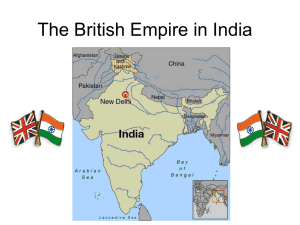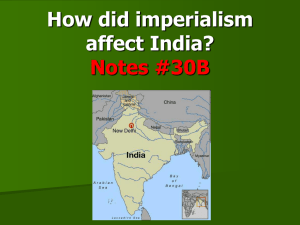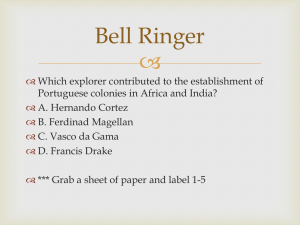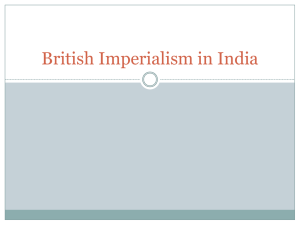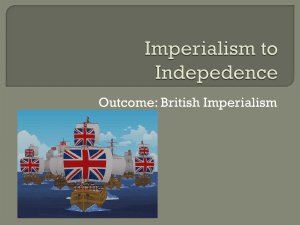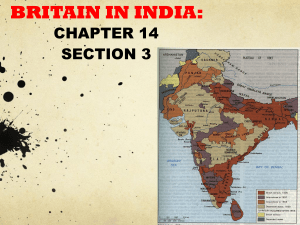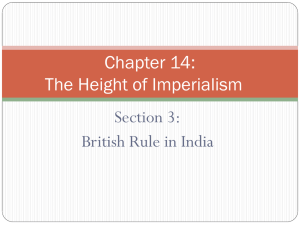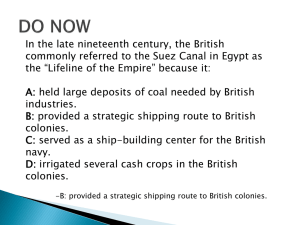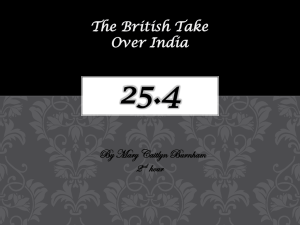The British Empire in India
advertisement
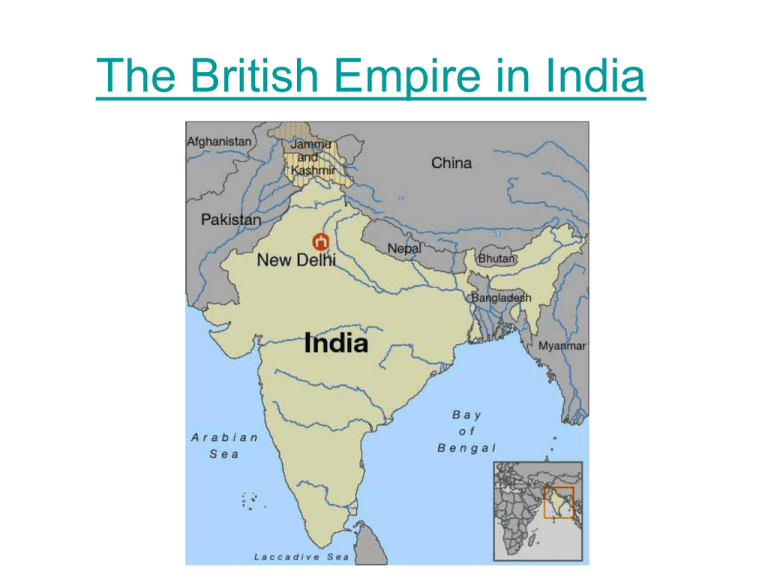
The British Empire in India I- Indian imperialism began with •The British East India Companyset up trading posts in India to control trade between India and Britain. N No total British control of India, - yet… •India’s ruling Mughal Empire kept European traders under control. D Decline of the Mughal Empire - •Beginning in 1707 allowed for the British East India Company to begin controlling India’s political and economic life. I India = Britain’s “Jewel in the Crown” - • Industrial Revolution has turned Great Britain into an industrial giant and India provides raw materials for production • “Jewel in the Crown” – the most valuable of Britain’s colonies • British setup restrictions that prevented Indian economy from operating on its ownforced to sell raw materials to Britain only and purchase only British goods growing resentment among many Indians The East India Company even had its own army, led by British officers and staffed by sepoys, or Indian soldiers. •By the 1830s, the East India Company (regulated by British Government) ruled India. •Many Indians resented British rule. A Angry Indians = total British control - •In 1857, a large number of British-trained Indian soldiers(sepoys) rebelled against their British officers •Sepoys believed that their bullet cartridges were sealed with pork and beef fat. •Muslims who don’t eat pork and Hindus who believe the cow to be sacred- had to break cartridges w. their teeth. They believed they were being forced to violate their religion Sepoy Rebellion •The Sepoy Rebellion was put down and India became a British possession •British rule in India from 17571947 •became known as Raj British Imperialism in India Positive RED Negative BLUE The British provided a single system of law and government, unifying India. They also introduced English as a unifying language. The British built roads, bridges, and railroads in India. They set up telegraph wires. However, India’s cottage industries, in which goods were made in homes, were hurt by competition with British goods. The British built hospitals, introduced new medicines, and provided famine relief. At the same time, health care improvements led to a population explosion without an increase in economic opportunities. Indians were also looked down upon by the British and their culture was treated as inferior to European culture. Indian workers provided the British with inexpensive labor. Indians worked for long hours under terrible working conditions. The British gained wealth while Indians were exploited. Foldable: FORMS OF IMPERIALISM • Colony • Protectorate • Sphere of Influence Colony TOP • Group of people who leave their native country to form a settlement in a new land • ***Still connected to their “mother country”*** BOTTOM • Direct Rule: officials sent from “MC” to rule, impose culture, language, politics and economics Protectorate TOP • Country whose policies are guided by a foreign country- not directly ruled. • Local rulers left in place, but accepted advice regarding trade, industry, politics & missionaries. BOTTOM • Indirect Rule: use of local rulers to administer laws & codes of “MC”, encourage cooperation to prepare for future industry. • EX: England & US Sphere of Influence TOP • Area in which an outside power claims exclusive investment & trading/economic privilege BOTTOM • When one country has trading rights in another place Sepoy Rebellion “You Are There” Diary Your task: Write a diary entry as if you were a sepoy living in India during the Sepoy Rebellion Keep in mind this is not a report on the event but the thoughts and feelings of someone living through it. Your diary should include any key terms or people involved with the event in some way. Instructions: •Write a one-paragraph entry about the beginning of the event. Include the date. Briefly described how the event began. •Write a one-paragraph entry about the middle of the event. Include the date. Mention whether things are better than the beginning or not. •Write a one-paragraph entry about the end of the event. Include the date. Describe your character’s feelings about the event now that he/she has lived through the whole thing.
